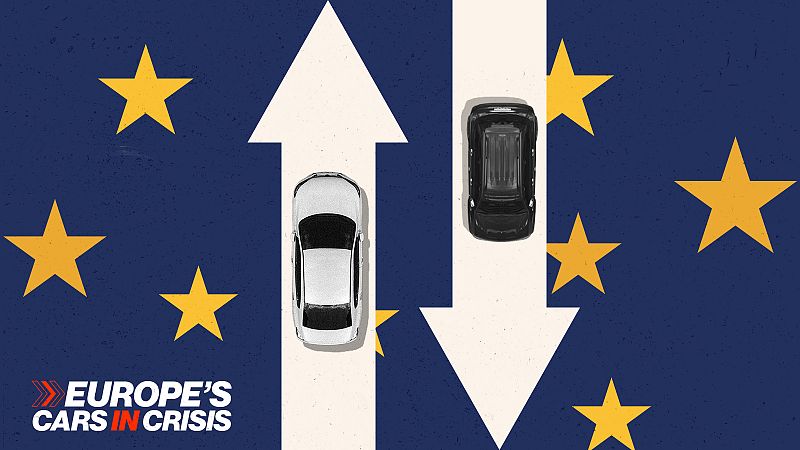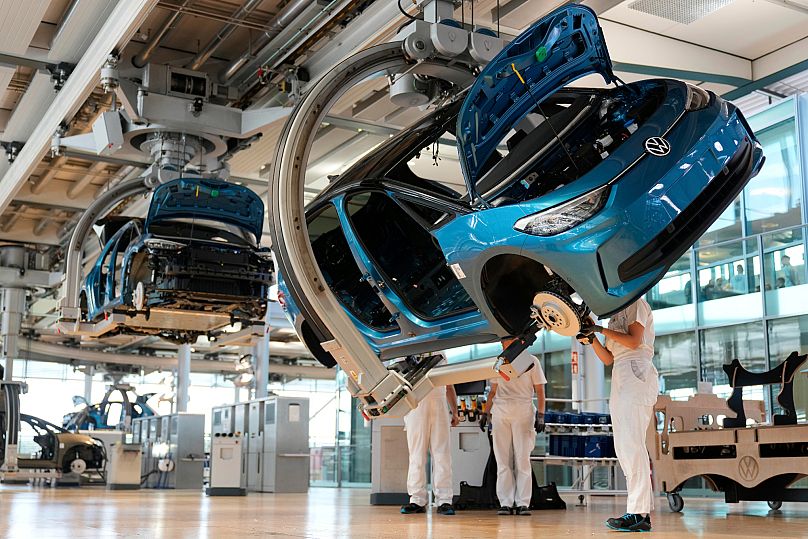Crash or rescue: European carmakers look to EU for salvation

Europe's car industry is “in mortal danger”, EU industry chief Stéphane Séjourné said a few months back, not mincing his words.
Stuttering sales, high energy prices, growing global competition and an uncertain regulatory and trade environment have plunged the sector into a spiralling crisis.
“There is a risk that the future map of the global car industry will be drawn without Europe,” Séjourné said back in April.
To tackle the sector’s most pressing challenges, EU Commission President Ursula von der Leyen will host the top car executives in Brussels on Friday.
It’s the third and last crisis meeting of its kind this year, part of what the Commission has billed the “Strategic Dialogue on the Future of the Automotive Industry”.
The meeting is scheduled for three hours – but will it create new momentum for the industry?
Last spring, the EU launched an Industrial Action Plan which includes funds for battery producers, most notably through the €1.8 billion Battery Booster and an additional billion euros allocated for battery research and development under the Horizon Europe programme.
But such initiatives have failed to change the overall gloomy outlook.
“The sense of urgency has not gone away,” Sigrid de Vries, director general of the European Automobile Manufacturers’ Association (ACEA) told Euronews. “We need more action.”
The carmakers are particularly frustrated over a lack of a pragmatic policy plan for the industry’s transformation, as expressed in a recent open letter to Ursula von der Leyen by the presidents of ACEA and the European Association of Automotive Suppliers (CLEPA), Ola Källenius and Matthias Zink.
Europe’s transformation plan “must move beyond idealism to acknowledge current industrial and geopolitical realities”, they wrote.
According to the industry representatives, lower energy costs for charging, more purchase subsidies and tax reductions and especially a more even distribution of charging infrastructure are needed to make switching to electric vehicles an obvious choice for a critical mass of European consumers and businesses.
EV market in Europe stagnating
Right now, the market share of battery-electric vehicles in Europe stagnates at around 15% - not enough for a breakthrough of a technology considered all-decisive for the future.
There is a considerable hesitation of many European consumers to buy an electric vehicle because there are still not enough charging stations in Europe, 75% of which are located in only three countries: the Netherlands, France and Germany.
Across the EU, only about 880,000 public charging points are currently available.
But according to estimates from ACEA, 8.8 million charging points will be needed by 2030 – that’s just five years from now.
To achieve this, 1.5 million chargers would have to be installed every year, almost ten times the current rate of growth.
Seeing more economic and legal trouble on the horizon, the car industry wants a review of current CO2 regulations.
“Meeting the rigid car and van CO2 targets for 2030 and 2035 is, in today’s world, no longer feasible,” as the presidents of ACEA and CLEPA wrote to Ursula von der Leyen.
Instead, they demand flexibility and pragmatism regarding drivetrain technologies (aka: the ban of combustion engines) as a crucial rescue rope for the embattled industry.
After all, “you cannot force people into a particular kind of car”, Sigrid de Vries said.
For years, electrification has been the key strategy deployed globally by the industry to produce zero emission vehicles, responding to a key quest of policymakers.
These vehicles are also becoming ever more connected and able to exchange information with other cars and roadside infrastructure, tending to become high-performance “computers on wheels”, increasingly dependent on chips and software.
As a consequence, new companies from the battery and tech sectors have entered the automotive market and leapfrogged traditional carmakers.
And here is where most European companies are still lagging behind their Asian rivals in electric car innovation. In 2024, only one electric car made in the EU was among the world’s Top Ten, the Volkswagen ID.3.
In this context, due to its quasi-control of the global battery production and low labour costs, China has risen as the electric vehicle manufacturing hub with Chinese cars becoming increasingly competitive.
And the People’s Republic remains by far the biggest global market.
Last year, according to Germany Trade & Invest, more than 32 million vehicles were sold in China, half of them electric (11 million in the European Union and 15 million in the United States).
At the IAA Mobility industry show in Munich this week, the largest in the world, the number of participating Chinese companies has increased by 40% to the highest level ever.
China's dominance and US tariffs
The growing Chinese dominance together with Donald Trump’s tariffs on European cars put Europe’s automotive industry under heavy pressure to adapt quickly to the new environment and develop industrial resilience to counter China, as the Report on EU competitiveness by the former Italian PM and ECB president Draghi pointed out.
Other experts advocate more cooperation with the Chinese.
“We need closer ties with China, not distancing ourselves. It would be stupid not to cooperate with the Chinese, as they hold all the cards,” Ferdinand Dudenhöffer, an economist and director of the Center Automotive Research (CAR) in Germany told Euronews.
“For this we need political support. What we don’t need is China-bashing.”
What is at stake is nothing less than the survival of the European car industry, widely regarded as the industrial backbone of the European economy, supporting more than 13 million direct and indirect jobs (more than 6% of total EU employment) and contributing roughly one trillion euro to the EU’s gross domestic product.
In Germany, Sweden and some eastern European countries, the car industry accounts for more than 10% of the manufacturing workforce.
So, when Germany, Europe’s biggest economy, lost 50,000 jobs in the car sector last year alone, the shockwaves were felt everywhere.
The country is home to some of the most famous carmakers in history, yet their survival is not guaranteed forever.
Just look at the United Kingdom whose car industry was once dominant, but today only has one 100% British brand left, the family-owned Morgan that makes hand-built sport cars.
“Every job lost, every factory shut down will not come back,” Dudenhöffer said.
“So, if the car industry struggles and declines, the general economic perspectives in Europe could be devastating for years to come.”
Today


